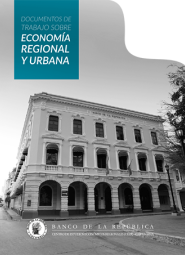Code of Conduct: 3. Banrep Employees Act with Integrity and Objectivity
3.1 Conflict of interest
As per Article 44 of Law 1952 of 20198 (General Disciplinary Code), a conflict of interest arises when a Banrep employee has a particular and direct interest in the regulation, management, control, or decision of an issue in which they intervene or act on the basis of their position or functions9.
- There is a particular interest when the regulation, management, control, or decision generates a specific benefit or advantage10 to the Banrep employee, or to his/her spouse or domestic partner, their relatives within the fourth degree of consanguinity, second degree of affinity or first degree of civilian kinship (Degrees of kinship are presented in Annex 1) or to their partners in de facto corporation, or de jure corporation11. The specific benefit may be of a personal, labor, economic, or financial nature, among others12.
Annex 1. Degrees of kinship
| Consanguinity | |
|---|---|
| Civil code. Article 35. "Kinship of consanguinity. Kinship of consanguinity is the relationship or connection that exists between persons who descend from the same trunk or root, or who are united by the bonds of blood." | |
| First grade | Parents/Children |
| Second grade | Siblings/Grandparents/Grandchildren |
| Third grade | Uncles-Aunts/Nephews and Nieces/Great-grandparents |
| Fourth grade | Cousins/Great-uncles and Great-aunts/Great-nephews and Great-nieces |
| Affinity | |
|---|---|
Civil code. Article 47. "Legitimate affinity. Legitimate affinity exists between a person who has been married and the legitimate blood relatives of their spouse. The line or degree of legitimate affinity of a person with a blood relative of their spouse, is qualified by the line or degree of legitimate consanguinity of said husband or wife with the said consanguineous. Thus a man is in the first degree of legitimate affinity, in the straight line, with the of his wife from the previous marriage; in the second degree of legitimate affinity, in the transversal line, with the legitimate brothers of his wife." By means of the judicial ruling C-595 of 1996, reporting judge Dr. Jorge Arango Mejía, the Constitutional Court declared unenforceable article 48 – and article 39 – of the Civil Code, which established: "Illegitimate affinity. It is the one that exists between one of the persons who have not contracted marriage and are connected by lustful desires, and the legitimate or illegitimate blood relatives of the other, or between any of the persons who are or have been married and the illegitimate blood relatives of the other." Despite the declaration of unconstitutionality, the Constitutional Court affirmed in the judgment that "(...) the declaration of unenforceability of articles 39 and 48 does not imply the disappearance of extramarital affinity, that is, the one originated in the permanent union referred to in articles 126 and 179 of the Constitution, among others. For all legal purposes, extramarital affinity continues to exist." | |
| First grade | In-laws/Stepchildren/sons-in-law and daughters-in-law |
| Second grade | Brothers-in-law/Grandparents or grandchildren of the spouse or permanent partner of the worker |
| Civil Kinship | |
|---|---|
| Civil code. Article 50. "Civil kinship. It results from the adoption, by which the law considers that the adopter, his wife and the adoptive parent are among themselves, respectively, in the relation of father, mother, child. This kinship does not go beyond the respective persons.". | |
| Single grade | Adopted children/adoptive parents |
b. There is a direct interest when the profit or benefit is generated immediately—without external circumstances or factors—from the regulation, management, control, or decision of the respective casee13. This means that there is no direct interest when it is simply hypothetical or accidental14.
The following should be taken into account in situations where a conflict of interest may arise:
- Disclose relations of kinship or partnership in fact or by law.
- Declare any private or financial interest that the Banrep employee, their spouse, or domestic partner, or his/her relatives or partners to hereinbefore mentioned have with third parties acting as Banrep contractors, particularly acting as a member of decision-making bodies such as the Purchase Committee or management areas with power to enter into contracts. Once the impediment has been exposed, the Banrep employee shall refrain from participating in the decision to contract or assess the supplier.
- Declare any private or financial interest arising from the Banrep’s employee or his or her relatives or partners hereinbefore mentioned with third parties who act as counterparty of Banrep’s in the trading desks. Once the impediment has been exposed, the Banrep employee shall refrain from negotiating with such a counterparty.
- Declare any private or financial interest of a Banrep employee, their spouse, or domestic partner, their relatives or partners hereinbefore mentioned when they are responsible to decide as a member of committees or other internal or external decision-making bodies. Once the impediment has been exposed, the Banrep employee shall refrain from participating in the corresponding decision.
- Accept only third-party gifts referred to in Section 7.2 of this Code.
The internal regulations set the procedure to be followed by Banrep employees to declare their impediments or motions for recusal. It is up to their superiors, the committee or corresponding body to decide on the matter.
Numeral 5 of article 56 of Law 1952 of 201915 states that it is a gross negligence by public servants not to declare the impediment in a timely manner, whenever there may be an obligation to do so; to delay the motion for recusals or to act after being separated from the matter.
3.2 Inabilities and Incompatibilities
Banrep employees should be aware of situations that generate inabilities and incompatibilities under the rules governing the exercise of their duties and provide the information requested
The members of the Board of Directors and the Governor are subject to the special inabilities and incompatibilities provided for in Articles 30 and 31 of Law 31 of 1992 (Articles 31 and 32 of the Bylaws of the Central Bank), 16 and all other Banrep employees, those established in Articles 51 and 52 of the Bylaws of Banrep17. In addition, both the Board Members and the Governor, as well as all other Banrep employees, are subject to the inabilities and incompatibilities set forth in Articles 12218, 12719, 12820 and 12921 of the political Constitution as well as those provided for in the Disciplinary Code, common to all public servants.
Also, Banrep employees should apply the regime of inabilities and incompatibilities provided for in the General Contracting Regulations for Public Administration22 in connection with contracting procedures at Banrep.
3.3 Political Activity
As per Article 110 of the Political Constitution23, as public servants, Banrep employees cannot make any contribution to political parties, political movements, or candidates, nor can they induce others to do so, subject to exceptions provided by the law. Failure to comply with any of these prohibitions may result in destitution.
Article 127 of the Political Constitution24 25 and numerals 1 and 2 of Article 60 of Law 1952 of 201926 state that the use of the position as employee by public servants to participate in the activities of the political parties, political movements, and political disputes, or to pressure individuals or subordinates to support a political cause or campaign, or to influence electoral processes of a partisan political nature, may constitute a very serious disciplinary fault.
Based on the provisions of Law 1952 of 2019, the Office of the Attorney General of the Nation has stated that public servants must refrain, among others, from27:
- To use the authority with which they are vested to serve a political cause.
- To use elements intended for public service to proselytize or to carry out political electoral activity in any sense.
- To use reserved information from the institution to which they may have access due to their position to proselytize or to perform political electoral activity in any sense.
- To exonerate themselves from the fulfillment of their constitutional and legal duties under the excuse of exercising the right of political participation.
- Using service time or working hours to manage political interests.
On the other hand, Article 38 of Law 996 of 200528 establishes the additional prohibitions29 for public servants listed below, which constitute gross negligence as disciplinary fault:
- Disseminate political advertisement for or against any political party, grouping, or political movement through publications, official tv and radio stations, or public printing, except as authorized by law.
- To favor those under their charge with improper promotions, bonuses, or employee promotion provided that participate in their same cause or political campaign, without prejudice to competitions on the merits which, under public conditions of equality and impartiality, may offer such possibilities to public servants.
- To offer any kind of direct, particular, immediate, and improper benefit to citizens or communities, through works or actions of the public administration in order to influence someone’s intention to vote.
3.4 Report on property, income, and private economic activity
Banrep employees have the duty to file and present to the Registry and Services Area of the Planning and Administrative Management Department the Sworn Declaration of Goods and Income and Private Economic Activity upon their entry to Banrep. This declaration must be updated annually within the time limit established for this purpose, and at the time of retirement from Banrep, in accordance with Law 190 of 1995 and its regulatory decrees30.
3.5 Compliance with civil, labor, commercial, or family obligations
According to numeral 11 of Article 39 of Law 1952 of 201931, Banrep employees are forbidden to fail repeatedly and unreasonably the compliance of civil, labor, commercial, or family obligations imposed by judicial decisions or admitted at conciliation proceedings32.
The Constitutional Court has stated that this prohibition seeks to guarantee that public servants respond to the citizen’s model of fulfilling their legal obligations and that they do not harm the public image of the State33.
3.6 Use of Banrep’s Physical and Technological Resources
Article 38, numeral 22 of Law 1952of 201934 provides that it is the duty of every public servant to monitor and safeguard the goods and values entrusted to them and to ensure that they are used properly and rationally, in accordance with the purposes for which they have been intended. Also, numeral 2335 of the same article provides that public servants must respond for the preservation of the tools, equipment, furniture, and property entrusted to their guard or administration and to account for their timely use.
For its part, Article 39, numeral 12 of Law 1952 of 201936 provides that all public servants are prohibited to cause harm or loss of property, elements, files, or documents that have come to their power to exercise their functions.
Banrep has made available to Banrep employees physical and technological resources that must be used safely, efficiently, and effectively by them to develop their functions.
Banrep has determined the guidelines for the management of fixed assets of Banrep, including activities aimed at their conservation, control, optimized use, and safeguard against loss, damage, or deterioration due to actions that may affect their value or functionality.
Banrep employees may make personal use of both the physical and electronic resources of Banrep provided that such use is limited (both in terms of resource consumption and working time), reasonable, and do not adversely affect the performance of their duties, confidentiality, and security of Banrep information, and resource availability37
Index
- Scope
- Corporate Values and General Principles
- Banrep Employees Act with Integrity and Objectivity
- Banrep Employees Protect Corporate Information and Third-Party Information Held by Banrep
- Banrep Employees Treat All Persons with whom they relate in their work with Respect, Impartiality, and probity and Create an Inclusive Work Environment
- Banrep Employees Act Transparently, Denounce, Report Changes in their Judicial Status when Required by Law, and Comply with the Rules on Prevention and Control of the Risk of Money Laundering and Terrorist Financing
- Other Duties
8 Article 44 of Law 1952 of 2019 provides: “Conflict of interests. Any public servant shall declare themselves impeded or unable to act on an issue where they have a particular and direct interest in its regulation, management, control, or decision, or it would come from their spouse, partner or domestic partner, or any of their relatives within the fourth degree of consanguinity, second of affinity or first civilian, or their partner or partners in fact or by law. When the general interest, proper of the public service, conflicts with a particular and direct interest of the public servant, they must declare themselves impeded.”
9 Ibid.
10 Constitutional Court. Sentence C-1040 of 2005. Reporting Judges: Manuel José Cepeda Espinosa, Rodrigo Escobar Gil, Marco Gerardo Monroy Cabra, Humberto Antonio Sierra Porto, Álvaro Tafur Galvis, and Clara Inés Vargas Hernández.
11 In this regard, see Article 40 of Law 734 of 2002 (concordance: Article 44 of Law 1952 of 2019).
12 Private interest is not necessarily pecuniary. The Council of State has expressed its opinion on this matter, stating that “as per the jurisprudence of this Chamber, the interest that arise the conflict must be direct, that is, the decision must result in the benefit of the public servant immediately, that is, without the need to mediate circumstances or elements external to it; to produce a special, particular, and concrete benefit in favor of themselves, their spouse or relative, and also that the impediment for said personal or family situation in the proceedings of the case is not evident” State Council Section One. Sentence of March 17, 2011. File: 25000-23-15-000-2010-001610-01. Judge: Rafael E. Ostau de Lafont Pianeta.
13 Constitutional Court. Sentence C-1040 of 2005. Reporting Judges: Manuel José Cepeda Espinosa, Rodrigo Escobar Gil, Marco Gerardo Monroy Cabra, Humberto Antonio Sierra Porto, Álvaro Tafur Galvis, and Clara Inés Vargas Hernández.
14 Ibid.
15 Article 56, numeral 5 of Law 1952 of 2019 states: “Faults related to the regime of incompatibilities, inabilities, impediments, and conflicts of interest. (…) 5. Not to declare oneself as impeded in a timely manner, whenever there is an obligation to do so, to delay the processing of the disqualification, or to act after having been separated from the issue at hand.”
16 Article 30 of Law 31 of 1992 (Article 31 of Decree 2520 of 1993) states: “On the inabilities to be a full-time member of the Board of Directors. The following may not be members of the Board of Directors:
a) Anyone who has been convicted at any time by a court sentence to be deprived of freedom, except for political or unintentional offenses.
b) Anyone who has been ousted by the authority exercising inspection and surveillance functions for misconduct against ethics in professional practice, during the previous ten (10) years.
c) Anyone with double nationality, except Colombians by birth.
d) Anyone who has been legal representatives within the year preceding their appointment, except for regional or branch managers, of any institution subject to the inspection and surveillance of the Superintendence for Banks Securities or their shareholders with a participation over 10% of the capital subscribed in the same period.
e) Anyone with a link of marriage, domestic partnership, or kinship in second degree of consanguinity, first of affinity, or first civil or legal, with other members of the Board of Directors or legal representatives—except regional or branch managers—, or members of the boards of credit institutions.
Paragraph. The inability provided for in subparagraph d) of this Article shall not apply to anyone who has acted in the year preceding his election as legal representative of Banco de la República.”
Article 31 of Law 31 of 1992 (Article 32 of Decree 2520 of 1993) provides: “On the incompatibilities of the members of the Board of Directors. The Members of the Board of Directors may not:
a) Exercise their profession and no other office during the period of the exercise of office, except for university lecture.
b) Enter into contracts with the Bank, on their behalf, or by an intermediator, or on behalf of another, or manage their business or those of others during the exercise of their office, nor within the year following their retirement.
c) At no time shall they intervene in matters of a particular and specific nature which they had dealt with during the performance of their duties and in connection with their position.
d) To intervene at no time in political or electoral proselytism, without prejudice to the free exercise of the right to vote.
e) To be legal representative, director, or shareholder of any institution subject to the inspection and surveillance of the Banking or Securities Superintendencies with a participation of more than 10% of the subscribed capital during the exercise of their position.
f) Those who have held the position as member of the Board may not be legal representatives nor members of the Board of Directors—except of Banrep itself—of any institution under the supervision of the Banking or Securities Superintendencies, until one year after they have ceased their duties.
g) The full-time members of the Board of Directors of Banco de la República may not, during the period for which they were elected, serve as Minister, Director of Administrative Department, or Ambassador. In the event of resignation, this incompatibility shall remain for one (1) year after their functions have ceased.
Paragraph 1. The use of goods or services offered by the Bank to the public, its officials or employees on equal terms is not subject to the incompatibilities of this Article.
Paragraph 2. The incompatibilities provided for in subparagraph (b) and (e) of this article, shall not apply to the Minister of Finance and Public Credit when, by legal attribution, they act on behalf of or by mandate of the Nation, they must act as legal representative or director of any institution under the supervision of the Banking or Securities Superintendencies.
Nor shall apply subparagraph e) of this Article to the Governor of Banco de la República with respect to their participation in the Board of Directors of Guarantee Funds of Financial Institutions.”
17 Article 51 of Decree 2520 of 1993 states: “Inabilities. An individual under the following inabilities may not be hired by Banco de la República:
1. Anyone who is linked by marriage or domestic partnership with any official or employee of the Bank.
2. Anyone who has kinship ties within the fourth degree of consanguinity, second of affinity or first civilian, with any official or employee of the Bank.”
Article 52 of Decree 2520 of 1993 states: “Incompatibilities. The employees of the Bank have the following incompatibilities:
1. During the exercise of their duties and within the year following their retirement, they may not enter into contracts with the Bank on their behalf or by an intermediator or manage their own or other businesses before the Bank. All acts and contracts derived necessarily from the employment relationship are exempted from this prohibition. It will also not apply in cases of the use of services offered to the public by the Bank, under conditions common to all those who request them.
2. They shall not, at any time, intervene in matters of a particular and specific nature that they may have dealt with during the performance of their duties and in relation to their office.
18 Article 122 of the Constitution provides: “there shall be no public employment with no functions detailed by the law or by the regulations, and to provide those of a remunerated nature it is required to contemplate it the payroll file and provided for their wages in the corresponding budget.
No public servant shall enter into office without taking the oath to comply with and defend the Constitution and to perform their duties.
They shall declare the amount of their property and income under oath before taking office, when resigning from office, or whenever the competent authorities request it.
Such declaration may only be used for the purposes and ends of the application of public server regulations.
Without prejudice to the other penalties provided for by the law, no individual who has been convicted at any time for the commission of crimes affecting the State's assets or those convicted of offenses related to belonging, promoting, or financing of illegal armed groups, crimes against humanity or drug trafficking in Colombia or abroad may be registered as candidate for positions of popular election, nor elected or appointed as public servant, nor personally or by someone else on their behalf enter into contracts with the State.
Neither can anyone who has given place, as a public servant with their willful conduct or gross negligence, qualified by execution of a sentence, to the State being condemned to a patrimonial reparation, unless they take charge of the value of the damage with their own patrimony.
Paragraph. Members of armed groups outside the law convicted for offenses committed because of, on occasion of, or directly or indirectly related to the armed conflict, albeit having signed a peace agreement with the Government or having been demobilized individually, inasmuch as they have dropped their weapons, they have abided by the transitional justice framework applicable in each case, including the Special Jurisdiction for Peace under the terms of this legislative act and have not been convicted of willful criminal offenses following the peace agreement or their demobilization shall be entitled to be designated as public employees or official workers as long as they have not been effectively deprived of their freedom, either preventively or in compliance with the sanction imposed on them, and shall be entitled to enter into contracts with the State, personally or by an intermediator. The persons referred to in this article shall not be unable to exercise a profession, art or duty.
The above provision shall also apply to members of the Public Force who submit to the Special Jurisdiction for Peace, who may be public employees, official workers, or contractors with the State, inasmuch as they are not effectively deprived of their liberty, either preventively or in compliance with the sanction imposed on them, without prejudice to the prohibition of re-incorporation into the active service provided for in Law 1820 of 2016 for the situations described therein.
As a contribution to the guarantees on non-repetition, the Colombian State will ensure that the events that occurred in the past are not repeated, and to this end it will implement the measures referred to in the General Peace Agreement in this matter. Those who have been punished for serious human rights violations or grave violations to international Humanitarian law shall not be allowed to take part in any security agency, State defense, judicial branch, or control agencies.”
19 Article 127 of the Constitution states: “Public servants, either on their behalf or by intermediators, or on behalf of others, shall not enter into any contract with public entities or private persons who manage or administer public resources, except for exceptions made by the law.
State Employees operating in the Judicial Branch or in electoral, control, and security agencies are forbidden to participate in the activities of political parties and political movements and in political disputes, without prejudice to the free exercise of the right to vote. The limitations referred to in Article 219 of the Constitution apply to members of the Public Force in active duty. Employees not covered by this prohibition may only participate in such activities and disputes under the conditions laid down in the Statutory Law.
The use of employment position to pressure citizens to support a political cause or campaign is considered a cause of misconduct.
20 Article 128 of the Constitution provides: “No one shall simultaneously hold more than one public employment or receive more than one allocation from the public treasury, or from companies or institutions in which the State has a majority share, except for the cases expressly determined by law.
Public treasury stands for that of the Nation, of the territorial entities, and of decentralized ones.
21 Article 129 of the Constitution provides: “Public servants may not accept positions, honors, or rewards from foreign governments or international agencies, nor enter into contracts with them, without prior authorization by the government.”
This rule covers distinctions of an immaterial nature such as a diploma or an award, or those with an economic or material content represented in a labor relationship, or the benefit or prize is related to a specific performance, referred to by the term “reward.” This impediment is also applicable for contracts with foreign governments or international agencies, without prior authorization from the National Government.
22 Provided for in Article 8 of Law 80 of 1993.
23 Article 110 of the Constitution provides: “Those who perform public functions are forbidden from making any contribution to political parties, political movements, or candidates, or from inducing others to do so, aside from the exceptions provided by the law. Failure to comply with any of these prohibitions will be the cause of destitution or loss of the investiture.”
24 Article 127 of the Constitution establishes: “Public servants may not enter into any contract, by themselves or by person, or on behalf of another, with public or private entities that manage or administer public resources, except for exceptions made by the law.”
State employees serving in the judicial branch, in electoral, control and security agencies are prohibited from taking part in the activities of parties and political movements and in political disputes, without prejudice to the free exercise of the right to vote. The limitations provided for in article 219 of the Constitution apply to members of the Security Forces in active service.
Employees not covered by this prohibition may participate in such activities and disputes only under the conditions laid down in the Statutory Law.
The use of employment position to pressure citizens to support a political cause or campaign is a cause of misconduct.
25 Regarding Article 127 of the Constitution, see Constitutional Court. Judgment C-794, 2014 (M.P. Mauricio Gonzalez Cuervo) and State Council. Consultation and Civil Service Chamber. Concept on December 03, 2013. Filed: 11001-03-06-000-2013-00534-00. Reporting Judge: Alvaro Namen Vargas.
26 Numerals 1 and 2 of article 60 of Law 1952 of 2019 state: “Faults related to intervention in politics. 1. Use the office to participate in the activities of political parties and political movements and in political disputes, without prejudice to the rights provided for in the Constitution and the law. 2. Use the employment position to pressure individuals or subordinates to support a political cause or campaign or to influence in electoral processes of a partisan political nature.”
27 Based on legal rules, Directive 008 of June 17, 2019, the Office of the Attorney General stated that in addition to the conduct described, public servants must refrain from:
i. Using the position to favor or support political causes of candidates for popular elections.
ii. Using their employment as a means of pressure on citizens to promote a particular cause or campaign.
iii. Using the contractual capacity of the State or its institutions to influence in a political cause.
iv. Conducting or facilitating institutional events or meetings to sponsor appearances or causes of persons with electoral or political aspirations.
v. Pressuring individuals, subordinates, or contractors to support a political cause or campaign, or to influence in an electoral process of a partisan political nature, or to influence in juries of election.
vi. Exercising the powers vested on them to illegitimately tilt the State's action in favor of a particular political movement or mainstream.
vii. Making financial contributions to parties, political movements, or candidates, or induce others to do so, except members of public corporations of popular choice who may make voluntary contributions.
viii. Favoring a political cause or to pressure others to support it, by individuals who exercise public functions and/or manage public resources.
ix. Employing official media to promote political causes.
28 “By which the election of the President of the Republic is regulated, in accordance with article 152 (f) of the Political Constitution of Colombia and with the provisions of Legislative Act 02 of 2004, and other provisions are issued.”
29 Article 38, numeral 1 of Law 996 of 2005 states that public servants are forbidden to: “1. Harass, lobby, or influence, in any way, subordinates to support any cause, campaign, or political controversy.” In addition, it sets that they are forbidden to: “(…) 5. Provide reasons of “good service” to dismiss officials classified in career service positions.”
30 In this regard, see Law 190 of 1995, Decree 1083 of 2015, “Unique Regulation of the Public Service Sector”, which was compiled in Title 16 of Part 2 of Book 2. The regulatory provisions of the Declaration of Goods and Income and Report of Economic Activity; and Decree 484 of 2017, which introduced amendments to it.
31 Article 39, numeral 11 of Law 1952 of 2019 states: “Prohibitions. All public servers are forbidden to: (…) 11. Repeatedly and unjustifiably breach civil, labor, business, or family obligations imposed in court decisions or admitted to in conciliation proceedings.”
32 The Constitutional Court declared the conditional constitutionality of this rule in Sentence C-728 of 2000 (Judge: Eduardo Cifuentes Muñoz). In this regard, the Court stated that the rule is constitutional under “(…) the understanding that the disciplinary investigation into the repeated and unjustified breach of the obligations of the public servant can only be initiated based on judgments handed down by the corresponding jurisdictions, providing that the official has not complied with his legal obligations.
33 In this regard, see Sentences C-728 of 2000 and C-949 of 2002, issued by the Constitutional Court. In these sentences, the Court declares the following: “The purpose of the rule under review is to ensure that public servants respond to the citizen’s model that meets their legal obligations and does not harm the public image of the State. Several reasons may lie behind this objective: on the one hand, that officials are the most visible representation of the State and their actions are expected to be consistent with the views proposed about the political community and the role of each of the associates within it; on the other hand, that public servants are responsible for carrying out state activities for the benefit of citizens and that, consequently, they must guarantee with their life that in the development of their duties will respond to the general interests of the community; furthermore, that, to a possible extent, public servants are freed from the disadvantages and disruptions that result from the continuing difficulties and disagreements arising from the failure to comply with private obligations, so that they can devote themselves fully to their work and the state entities shall not be involved in such conflicts; and finally, that the officials do not protect themselves as servants of the State to commit outrages on the understanding that their condition infuses fear in those affected by their decisions.”
34 Article 38, numeral 22 of Law 1952 of 2019 states: “Duties. The duties of every public servant are: (…) 22. To monitor and safeguard the goods and values entrusted to them and to care that they are used properly and rationally, in accordance with the purposes for which they have been given.”
35 Article 38, numeral 23 of Law 1952 of 2019 states: “Duties. The duties of every public servant are: (…) 23. To be responsible for the conservation of the tools, equipment, furniture, and property entrusted to their guard or administration and to render account in due time for their use.”
36 Article 39, numeral 12 of Law 1952 of 2019 states: “Prohibitions. All public servers are forbidden to (…) 12. “Cause damage or the loss of goods, items, files, or documents that have come to their possession because of their functions.”
37 The Internal Regulation of Banrep states that the technological resources that the Bank makes available to the persons who provide their services to it for the execution of their functions are Bank’s property. Banrep allows limited (resource consumption and working hours) and reasonable use of these for personal matters, provided that the confidentiality and general security of the Bank's information are protected, the compliance of the duties and labor obligations of each employee and/or contractor, the availability of resources, the security of the Bank's technological infrastructure, and the effectiveness and timeliness of the services provided to the rest of the Bank or its clients are not compromised. (DSI-P5-E1 Standard).






















































